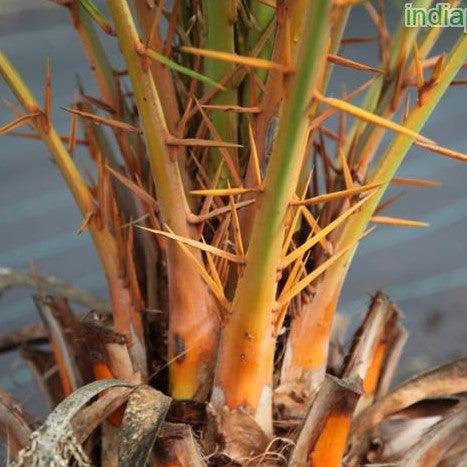

Description
- Common name:
- Slender Date Palm, Mountain Date Palm
- Regional name:
- Marathi - Shaili
- Category:
- Palms and Cycads, Trees
- Family:
- Palmae or Coconut family
- Light:
- Sun growing
- Water:
- Normal, Can tolerate less
- Primarily grown for:
- Foliage
- Flowering season:
- January, February, March, Flowers are inconspicuous
- Foliage color:
- Green
- Plant Height or length:
- 8 to 12 meters
- Plant Spread or Width:
- 2 to 4 meters
- Plant Form:
- Upright or Erect
-
Plant Description:
- Phoenix robusta, also known as the robust date palm or the cane palm, is a species of date palm native to Southeast Asia. It is a large, solitary palm that can reach heights of up to 30 meters. The trunk is thick and heavily armed with spines. The leaves are large, feather-shaped, and can be up to 6 meters long. The fruit of the Phoenix robusta is yellow-orange and about the size of a small hen's egg. They are not typically consumed as a food source but the sap is used for palm sugar, also the leaves are traditionally used for roofing, mats and baskets. It is widely grown in tropical and subtropical regions, both for its ornamental value and for its various uses in traditional construction and crafts.
-
Growing tips:
-
Phoenix robusta, or robust date palm, is a hardy and adaptable plant that can tolerate a wide range of growing conditions. However, it does have some specific needs in order to thrive.
-
Sunlight: Phoenix robusta prefers full sun, but can tolerate partial shade. It's a good idea to provide protection from the afternoon sun in hot climates.
-
Soil: Phoenix robusta can grow in a variety of soils, but prefers well-draining soil that is slightly acidic to neutral (pH 6.0-7.0). It can tolerate sandy, clay, or loamy soil, but avoid poorly drained soils.
-
Water: The Robusta Date Palm is relatively drought-tolerant once established, but it prefers to have regular deep watering. It should be watered deeply, but infrequently.
-
Temperature: Phoenix robusta is a tropical plant that prefers warm temperatures. It is not frost-tolerant and should be protected from temperatures below freezing. Ideal temperatures for this palm are around 30-35C
-
Fertilizer: Phoenix robusta is a heavy feeder that can benefit from regular fertilization during the growing season. Use a balanced, slow-release fertilizer, or a fertilizer specifically formulated for palms.
-
Pruning: Prune off dead or dying fronds as needed to keep the plant looking neat and healthy. However, Phoenix robusta should not be pruned heavily, it can damage the tree
Overall Phoenix Robusta is a hardy, resilient palm species which is generally easy to grow and care for as long as it is provided with the right conditions.
-
-
Benefits:
-
Phoenix robusta, also known as the robust date palm, has a wide range of traditional and modern uses. Some of the benefits include:
-
Ornamental value: Phoenix robusta is a large, striking palm that can be used as an ornamental plant in gardens, parks, and other landscaped areas. It's also known for creating a tropical atmosphere to any area it is planted.
-
Construction and crafts: Phoenix robusta is a useful source of material for traditional construction and crafts. The leaves are used for thatching roofs and making mats and baskets, and the trunk can be used for building poles and posts.
-
Food and drink: The sap of the Phoenix robusta is a source of sugar and alcohol. It can be fermented to make a beverage called "toddy" and processed to make palm sugar, jaggery.
-
Medicinal: The leaves and sap of Phoenix robusta have been used in traditional medicine for a variety of ailments, including diabetes, cancer, and skin conditions.
-
Environmental : Phoenix robusta is a good air purifying plant, known to remove pollutants like xylene and toluene from the air.
Overall, Phoenix robusta is a valuable and versatile plant with a wide range of benefits and uses, in addition to its ornamental value. it's also one of the most common, hardy, and low-maintenance species of date palms.
-

